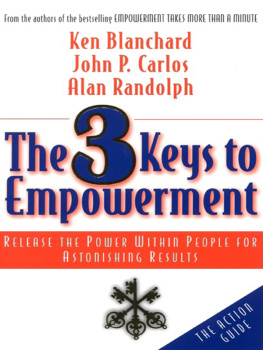Empowerment in Action
Empowerment in Action
Self-Directed Groupwork
Audrey Mullender, Dave Ward, Jennie Fleming
Audrey Mullender, Dave Ward, Jennie Fleming 2013
All rights reserved. No reproduction, copy or transmission of this publication may be made without written permission.
No portion of this publication may be reproduced, copied or transmitted save with written permission or in accordance with the provisions of the Copyright, Designs and Patents Act 1988, or under the terms of any licence permitting limited copying issued by the Copyright Licensing Agency, Saffron House, 610 Kirby Street, London EC1N 8TS.
Any person who does any unauthorized act in relation to this publication may be liable to criminal prosecution and civil claims for damages.
The authors have asserted their rights to be identified as the authors of this work in accordance with the Copyright, Designs and Patents Act 1988.
First published 2013 by
PALGRAVE MACMILLAN
Palgrave Macmillan in the UK is an imprint of Macmillan Publishers Limited, registered in England, company number 785998, of Houndmills, Basingstoke, Hampshire RG21 6XS.
Palgrave Macmillan in the US is a division of St Martins Press LLC, 175 Fifth Avenue, New York, NY 10010.
Palgrave Macmillan is the global academic imprint of the above companies and has companies and representatives throughout the world.
Palgrave and Macmillan are registered trademarks in the United States, the United Kingdom, Europe and other countries
ISBN: 9780230298170
This book is printed on paper suitable for recycling and made from fully managed and sustained forest sources. Logging, pulping and manufacturing processes are expected to conform to the environmental regulations of the country of origin.
A catalogue record for this book is available from the British Library.
A catalog record for this book is available from the Library of Congress.
Audrey: To my mum and dad, who cared for me so lovingly and now its my turn.
Dave: To St. Clements Secondary School, Mansa, Zambia, where I learned the meaning of empowerment.
Jennie: To Martha and Joe who are my constant delight and inspiration.
List of Illustrations
Boxes
Figures
Tables
Acknowledgements
Thank you to all the people who have shared their experiences of groupwork with us. They have given deep and rich insights into the reality of groupwork and most importantly have enriched our thinking and knowledge about self-directed groupwork and how it is being put into practice. Our conversations with them have helped connect and relate individual ideas, thoughts and groups to come together in creating a story reflecting the richness and complexity of what groupworkers and members told us.
Those Who Specifically Contributed Information for the Book
Action Autonomie, Canada: Sylvain and members of Le Collectif.
Advocacy in Action, UK: Julie Gosling.
Anti-Mosquito Device Campaign, UK: Harrison Carter.
Famijeunes, Canada: Kim Normandin and team members.
No Limits Dementia and Family Action Network, UK: Larry Gardiner.
SupportNet, UK: Carolyn Caldwell, Julianne Christou, Angela Hayes, Helen Jones.
University of Massachusetts, Boston, USA: Joan Arches, Elizabeth Boates, Archana Patel, Danielle Smith, Kelsey Warner.
Youth Dreamers, Baltimore, USA: Kristina Berdan, Dominique Davis, Miriam Harris, Aniya Hodges, Keyani Kenny and Chris Lawson.
Bill Badham, Thilo Boeck, Mathilde Buet, Ian Boulton, Andrea Clegg, Jo Dooher, Audrey-Anne Dumais-Michaud, Helen Price, Annie Pullen Sansfacon, Paddy McCullough, Marie-Joelle Robichaud, Fizz Shelton and Sebastien Simard.
Natalie Print for her help with the manuscript and Sarah Wilson for her help with referencing.
We must also acknowledge the contribution of all those who have worked at the Centre for Social Action, who have been part of self-directed or social action projects over the years or who have debated with us. All these people have made valuable contributions to the development of the theory and practice described in this book.
Introduction
What Is It All About?
The self-directed groupwork model arose from practice, not theory: a reflexive process of information-gathering, analysis, understanding, action and reflection that is mirrored in its practical application. The model emerged as result of in-depth enquiry and critical reflection with individuals, with teams and in networks where we discovered groupwork was taking place. This formed the basis of Self-directed Groupwork: Users Take Action for Empowerment (1991), the original version of this book, and the process has been revisited and repeated in preparation for this new edition. Once more, we have asked people to describe what they are doing and to explain why, thus enabling us to build up a rich and deep description and analysis of their activity. Germane theory has been drawn upon to clarify and explain what, why and how, particularly why, practitioners have been doing what they were doing.
The term self-directed emerged, in the first instance, as simply descriptive of the activity in groups we came across. This finding, that self-directed portrayed what many practitioners were helping service users to be, led to our coining the term self-directed groupwork as the name for a discrete, observable, explicable and recordable mode of groupwork practice. We found that we had moved from an informal, orally communicated practice tradition into a formally articulated one that became open and accessible to academic and practitioner scrutiny and critique.
Self-directed Groupwork
Our initial objective for this new edition was to find out how relevant people think the model is now and how widespread is its use or at least where there are people who are working in ways that relate to it. We have had contact with people in the UK, Ireland, France, the USA, Canada and New Zealand and lengthy conversations with many. In the event, as the many examples in this book will reveal, we found a wealth of self-directed groupwork happening. We came across groups based in, and arising directly from, awareness of the model as well as people who, when we described the process and principles, immediately responded with That is a model I recognize or That is just what we do. Distinctively, all these groups, which have helped to develop our understanding of contemporary self-directed groupwork, incorporate a primary focus on addressing a shared structural issue rather than meeting the individual needs of the participants, although of course the latter may still happen.
One thing that we realized was that, in England at least (it is no longer possible to generalize for the UK), the substantial involvement of social workers and probation officers in such groupwork has evaporated since we first wrote. The focus of state social work has narrowed to the oversight and management of individuals and families; probation now sits within the National Offender Management Service as a community corrections agency. Twenty years ago groupwork was a core element of training but now very few social work courses in England teach it (although this is not the case in other parts of the world). In compensation, however, we identified much self-directed groupwork in the voluntary sector and amongst many groups with no professional involvement at all. There are many self-run, service user-led and egalitarian groups, facilitated by group members. In these groups roles are often fluid, with groupworker functions being recognized, agreed and shared amongst members.








